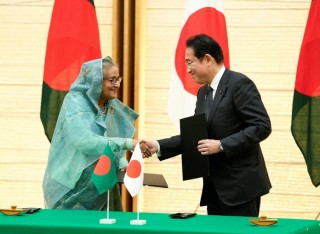Loading
Search
▼ Japan Brings Bangladesh Into The Folds Of New Security Framework
- Category:Other
On 26 August 2023, the Japanese Ambassador to Bangladesh, Iwama Kiminori, announced that Tokyo had incorporated Dhaka into its ‘Official Security Assistance (OSA)’ framework to enhance defence cooperation.
The OSA, which came into effect in April 2023, is Japan’s new security initiative that centres on assisting ‘like-minded’ countries with military aid amid the escalating regional security environment. The other countries currently included in the OSA are Malaysia, the Philippines and Fiji.
Outside of Tokyo’s ambitions to be a more involved geopolitical actor in the region, what is also apparent in Japan’s security considerations is the shared context in which the selected countries operate.
The Philippines has had numerous skirmishes with the Chinese People’s Liberation Army, coast guard and maritime militia vessels near Ayungin Shoal — an island in the South China Sea under Manila’s control but claimed by China within its ‘nine-dash line’.
In August 2023, Fijian Prime Minister Sitiveni Rabuka warned China and the United States against polarising ‘the Pacific into their camps’, amid growing US concern over China’s escalating activities in the region.
While willing to negotiate with China over the South China Sea dispute, Malaysia has made it clear that its state energy firm Petronas’ energy exploration sites fall within the country’s maritime borders.
Most countries selected for the OSA harbour grievances against China. Japan’s strategic thinking reflects the concerns of the United States and the Quad about China’s growing influence in the Pacific Islands.
But it is unclear why Tokyo has allocated a distinct defensive budget towards Dhaka, which maintains warm relations with Beijing and purchases a significant portion of its weaponry from China.
Japan maintains economic partnerships with most Asian countries, particularly Bangladesh. Dhaka has received around US$25 billion in development and economic assistance from Tokyo since 1972 and around US$9.2 billion of this has been overseas development assistance.
Japanese companies were also behind the construction of Dhaka’s metro line. But the most crucial aspect of Japan’s economic engagement was the transfer of the Matarbari deep seaport construction from Chinese developers to Japan.
The least-discussed element of the bilateral relationship is the potential for defence cooperation and its significance for both countries amid escalating global geopolitical tension.
The OSA will take the form of grants, rather than loans, aimed at strengthening the region’s ‘comprehensive defence architecture’ without the burden of repayment. This will enable Dhaka to take a significant step towards its military modernisation goal.
While Bangladesh is intent on maintaining geopolitical neutrality amid the US–China power struggle in Asia, Dhaka and Washington have intensified their rhetoric against each other.
In April 2023, the United States highlighted instances of human rights violations by the incumbent party in Dhaka. In 2021, Washington levied sanctions on multiple Bangladeshi security officials for employing extrajudicial tactics while on duty and prohibited their entry into the United States.
The United States also denied entry to various government officials, politicians and law enforcers suspected to have been complicit in rigging elections.
Bangladeshi Prime Minister Sheikh Hasina fought against Washington’s criticism, accusing the United States of seeking a regime change and underscoring its history of overthrowing governments that do not align with its interests.
This tension does not indicate a souring relationship between Washington and Dhaka over Bangladesh’s growing economic connections with China. It merely highlights the United States’ values-based foreign policy and its emphasis on the promotion of democracy.
Given this context, Japan’s inclusion of Bangladesh in the OSA holds strategic significance for several key reasons. Primarily, it serves Tokyo’s geopolitical interest in balancing China’s growing economic and defence investments in Dhaka and the surrounding region.
More importantly, Japan’s strategic cooperation manoeuvres are a testament to the Quad’s commitment to establishing a regional hold in South Asia.
This will become especially pertinent should US–Bangladesh tensions continue to rise, as it would help to balance any potential strain in relations between the Biden administration and Hasina’s government.
Bangladesh’s enhanced ties with Japan seem to be an outcome of careful geopolitical balancing by all actors. Tokyo is well placed to manage the relationship between Shaka and Washington to ensure Bangladesh stays within the United States’ umbrella while maintaining its neutrality.
- November 20, 2023
- Comment (0)
- Trackback(0)


